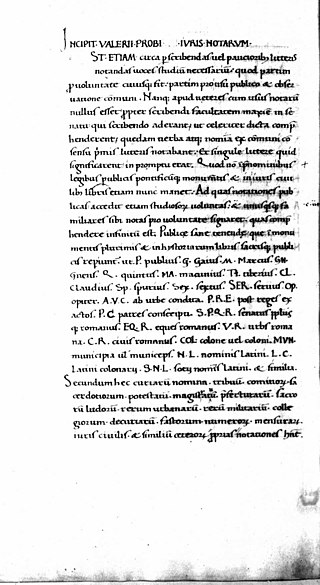Notes
- 1 2 3 One or more of the preceding sentences incorporates text from a publication now in the public domain : Chisholm, Hugh, ed. (1911). "Terentianus". Encyclopædia Britannica . Vol. 26 (11th ed.). Cambridge University Press. p. 641.
Terentianus, surnamed Maurus (a native of Mauretania), was a Latin grammarian and writer on prosody who flourished probably at the end of the 2nd century AD. [1]
His references to Septimius Serenus and Alphius Avitus, who belonged to the school of "new poets" (poetae neoterici or novelli) of the reign of Hadrian and later, seem to show that he was a near contemporary of those writers. He was the author of a treatise (incomplete) in four books (written in a variety of metres), on letters, syllables, feet and metres, of which considerable use was made by later writers on similar subjects. The most important part of it is that which deals with metres, based on the work of Caesius Bassus, the friend of Persius. [1]
By some authorities Terentianus has been identified with the prefect of Syene mentioned in Martial (i. 86), which would make his date about a century earlier; others, again, who placed Petronius at the end of the 3rd century (a date no longer held), assigned Terentianus to the same period, from his frequent references to that author. [1]

Priscianus Caesariensis, commonly known as Priscian, was a Latin grammarian and the author of the Institutes of Grammar, which was the standard textbook for the study of Latin during the Middle Ages. It also provided the raw material for the field of speculative grammar.

Servius was a late fourth-century and early fifth-century grammarian. He earned a contemporary reputation as the most learned man of his generation in Italy; he authored a set of commentaries on the works of Virgil. These works, In tria Virgilii Opera Expositio, constituted the first incunable to be printed at Florence, by Bernardo Cennini, in 1471.
Gaius Caesius Bassus was a Roman lyric poet who lived in the reign of Nero.

Marcus Valerius Probus, also known as M. Valerius Probus Berytius or Probus the Berytian, was a Roman grammarian and critic, who flourished during Nero's reign.
Macrobius Ambrosius Theodosius, usually referred to as Macrobius, was a Roman provincial who lived during the early fifth century, during late antiquity, the period of time corresponding to the Later Roman Empire, and when Latin was as widespread as Greek among the elite. He is primarily known for his writings, which include the widely copied and read Commentarii in Somnium Scipionis about Somnium Scipionis, which was one of the most important sources for Neoplatonism in the Latin West during the Middle Ages; the Saturnalia, a compendium of ancient Roman religious and antiquarian lore; and De differentiis et societatibus graeci latinique verbi, which is now lost. He is the basis for the protagonist Manlius in Iain Pears' book The Dream of Scipio.
Aelius Festus Aphthonius is believed to be the author of a Latin work called De metris omnibus incorporated as part of the Ars Grammatica of the fourth-century AD Christian writer Gaius Marius Victorinus.
Flavius Caper was a Latin grammarian who flourished during the 2nd century AD.
Quintus Terentius Scaurus was a Latin grammarian who flourished during the reigns of Trajan and Hadrian.
Flavius Sosipater Charisius was a Latin grammarian.
Aemilius Asper, Latin grammarian, possibly lived in the 1st century AD or late 2nd century AD.
Arusianus Messius, or Messus, Latin grammarian, flourished in the 4th century.
Dositheus Magister was a Greek grammarian who flourished in Rome in the 4th century AD.
Velius Longus, Latin grammarian during the reign of Trajan, author of an extant treatise on orthography. He is mentioned by Macrobius and Servius as a commentator on Virgil.
An ars grammatica is a generic or proper title for surveys of Latin grammar. The first ars grammatica seems to have been composed by Remmius Palaemon, but is now lost. The most famous ars grammatica since late antiquity has been that composed by Donatus.
Johannes Crastonis was an Italian renaissance humanist and scholar. Crastonus was probably born in Castel San Giovanni close to Piacenza. He was a member of the Carmelites. He studied in Constantinople but migrated to Modena in Italy. There he published a Greek-Latin dictionary about 1480.
The gens Septimia was a minor plebeian family at ancient Rome. The gens first appears in history towards the close of the Republic, and they did not achieve much importance until the latter half of the second century, when Lucius Septimius Severus obtained the imperial dignity.
Flavius Mallius Theodorus was a Roman politician and author of an extant treatise on metres, De metris, one of the best of its kind. He also studied philosophy, astronomy and geometry, and wrote works on those subjects, which, together with his consulship, formed the subject of a panegyric by Claudian.

Theodor Heinrich Gottfried Keil was a German classical philologist. He was a son-in-law to educator Friedrich August Eckstein (1810–1885).
Atilius Fortunatianus was a Latin grammarian. He was the author of a treatise on metres, dedicated to one of his pupils, a youth of senatorial rank, who desired to be instructed in the Horatian metres. The manual opens with a discussion of the fundamental ideas of metre and the chief rules of prosody, and ends with a detailed analysis of the metres of Horace. The chief authorities used are Caesius Bassus and the Latin adaptation by Juba the grammarian of the Τέχνη of Heliodorus. Fortunatianus being a common name in the African provinces, it is probable that the author was a countryman of Juba, Terentianus Maurus and Victorinus.
Marius Plotius Sacerdos was a Roman grammarian who flourished towards the end of the third century CE. He wrote an ars grammatica in three books, the third of which treats of meter.